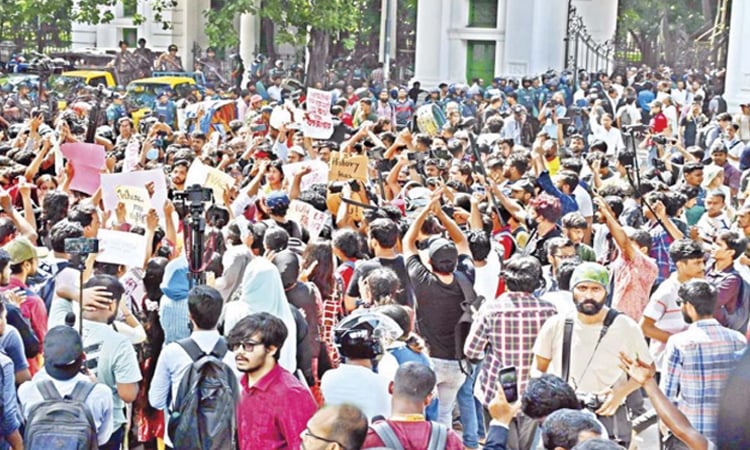News Flash

DHAKA, July 30, 2025 (BSS) - The Anti-Discrimination Student Movement, which initially began as a campaign for quota reform in government jobs, gradually evolved into a widespread anti-government uprising. This movement ultimately led to the ouster of Sheikh Hasina's authoritarian regime on August 5, 2024. Among the various phases and forms of protest, the 'March for Justice' held on July 31 last year proved to be a defining moment that paved the way for her downfall.
On that day, protesters across the country observed the programme in front of or near court premises, holding processions despite severe crackdowns carried out by law enforcement agencies loyal to Hasina. The 'March for Justice' brought renewed focus to the serious human rights violations committed by the Sheikh Hasina government, including indiscriminate killings, mass arrests, enforced disappearances, fabricated charges and brutal attacks on dissenters.
People from all walks of life regardless of political affiliation, class, or profession poured onto the streets of Dhaka, Chattogram, Khulna, Barishal, Rajshahi, Sylhet, and other regions, making the programme a resounding success.
In several locations, police used force to disperse demonstrators by charging with batons, and deploying sound grenades and tear gas shells. Over a hundred protesters were detained, and at least 90 individuals, including journalists, were injured in the clashes.
In Dhaka, students and teachers began gathering near the High Court shrine gate from noon. Around 12:30 pm, police detained several protesters. Undeterred by the arrests, remaining demonstrators held a sit-in for nearly three hours, chanting slogans in defiance. Teachers, including Professor Lutfur Rahman, then convener of Dhaka University's White Panel, joined the protest to lend moral support. A group of lawyers also participated by marching inside the High Court premises.
Meanwhile, another group of students attempted to march toward the High Court around 1:00 pm but were intercepted by police. Denied entry, they regrouped at Doel Chattar and later proceeded to the Central Shaheed Minar, where they held a rally.
At Jahangirnagar University, students and faculty brought out a procession under the banner of the anti-discrimination student movement. Around 1:00 pm, students gathered near the Mahua Chattar adjacent to the new Arts Faculty building for a rally and signature campaign, which was followed by a protest march.
In Sylhet, police blocked the 'March for Justice' programme. When students attempted to push through the barricade, police responded with sound grenades and tear gas, dispersing the crowd and injuring at least 20 protesters, most of them students.
That same day, two rival factions of the Supreme Court Bar Association held separate press conferences on the movement. Association President Barrister A M Mahbub Uddin Khokon addressed the media first, followed by a counter briefing by Secretary Shah Manjurul Haque.
In the international sphere, the European Union (EU) postponed its first round of talks on a new partnership and cooperation agreement with Bangladesh, which had been scheduled for September. A spokesperson cited the ongoing situation in Bangladesh as the reason for the postponement.
Amid the escalating unrest, several ministers and Members of Parliament reportedly fled the country. Observing the deteriorating political climate, many influential individuals purchased tickets and departed for destinations including the US, UK, Canada, Singapore, Australia, India, Thailand, China, and Dubai.
Later that day, access to social media platforms such as Facebook, TikTok, and WhatsApp, which had been blocked, was restored. Users regained access to these platforms after 3:00 pm.
The United Nations Human Rights Office expressed deep concern over the excessive use of force, arbitrary arrests, and abuse of protesters during the quota reform movement. In a letter to then prime minister Sheikh Hasina, UN High Commissioner for Human Rights Volker Turk emphasized the urgent need for long-term reform in the security sector to prevent further abuses.
A group of former DUCSU leaders and representatives from the all-party student alliance of the 1990s demanded the immediate release of six detained central coordinators of the movement, who were in the custody of the Detective Branch (DB).
In Washington, U.S. Senators Ben Cardin and Cory Booker issued a joint statement condemning the excessive use of force by Bangladeshi law enforcement agencies against student protesters, expressing concern over the worsening situation in the country.
Also on July 31, Indian High Commissioner to Bangladesh Pranay Verma met then prime minister Sheikh Hasina at her official Ganabhaban residence. During the meeting, Hasina alleged that the protesters were attempting to replicate the Sri Lanka scenario to topple her government. Later that day, she visited Kurmitola General Hospital to meet those injured in the violence.
According to media reports, a total of 10,735 individuals had been arrested across the country up to that point, with the government labeling the quota protesters as perpetrators. Between the night of July 30 and the afternoon of July 31 alone, at least 341 people were arrested, bringing the total number of arrests in the capital to 2,950.
Significantly, on July 31, Additional Commissioner Md Harun-or-Rashid was removed from his position as head of the Detective Branch (DB) of the Dhaka Metropolitan Police (DMP) and reassigned as Additional Commissioner for Crime and Operations at the DMP. He was replaced by Additional Commissioner Ashrafuzzaman as the new DB chief.
A three-member United Nations delegation, including UN Resident Coordinator in Bangladesh Gwen Lewis, met separately with Law Minister Anisul Huq and Home Minister Asaduzzaman Khan at the Secretariat. The delegation reportedly inquired about how soon normalcy would return in the country.
That evening, the student coordinators announced a new programme titled "Remembering Our Heroes" for August 1. In a statement, co-coordinator Rifat Rashid declared that the day would be dedicated to commemorating the harrowing moments of torture. Families and friends of the deceased and injured were expected to share their stories, while students would create paintings, graffiti, wall writings, festoons, and digital portraits to depict the various incidents of repression.